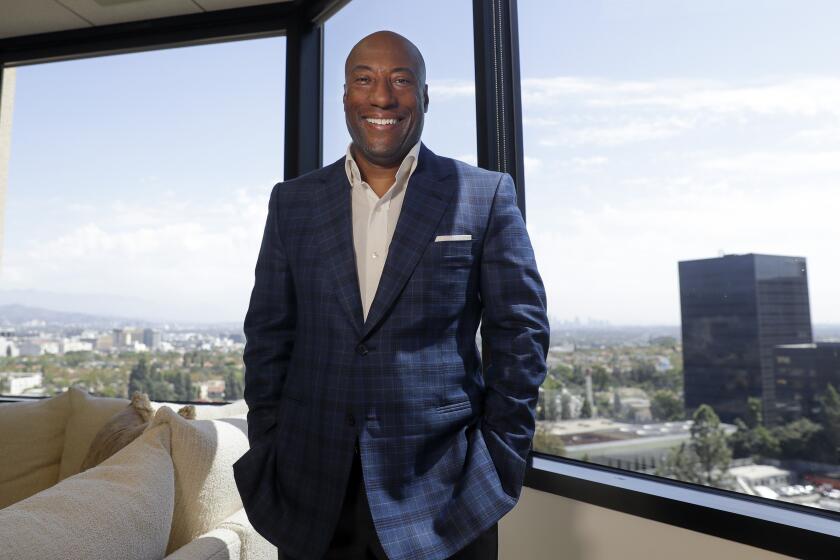Foreign MBA Students Do Homework on U.S.
- Share via
Meet the latest Japanese import: Takashi Shigemori, a 28-year-old executive with Sumitomo Chemical, who is in pursuit of the ultimate American business credential, an MBA.
As a second-year student at the University of Virginia’s Darden Graduate School of Business Administration, Shigemori is among the droves of Japanese middle managers flocking to America’s best business schools, along with a growing number of other foreign students.
There is no small irony in their presence here, since America’s corporate management techniques and performance hardly are the envy of the industrialized world. But American markets are, and the degree provides membership in the exclusive MBA club and a way to gain quick insight into American culture, consumer psychology and buying habits.
“Clearly, the United States is viewed as the hub of MBA education,” said Charles Hickman, director of projects and member services with the American Assembly of Collegiate Schools of Business. But foreigners “often don’t come for what is taught in class but to make the connections and to learn the culture.”
Contacts made in the top echelons of American business and academia also are considered important for young Japanese managers who hope to advance in their careers when they return to Japan. Also, the Japanese system of training executives is done in-house, with virtually no opportunity for formal graduate-level study.
“I am supposed to know American culture, American business and customs,” said Shigemori. “The company appreciates the learning rather than the degree.”
Although engineering continues to be the strongest attraction for foreign students--almost 22% of the 343,780 in the United States last year were in that field--overall engineering enrollment has been declining since 1984. For business and management courses, however, enrollment has been increasing since 1969 at the expense of the humanities, social sciences and other major fields of study, according to the Institute of International Education.
Specifically, enrollment in business study at the graduate and undergraduate level has hovered around 65,000, or 19%, of all foreign students in the United States since 1984. But significant increases will occur this year if foreigners seeking admission to MBA programs translate into enrollments.
“They are coming after the U.S.A., not an MBA,” said Darden School Dean John Rosenblum. “It’s two years of intense experience in business, industrial policy and culture.”
Darden’s pool of international applicants has grown to 419 from 55 countries for this year, up from 98 applications two years ago. The largest number seeking admittance was from India, but the biggest increase came from Japan, with 47 applications for the fall class, up from seven two years ago. Eight of Darden’s Japanese applicants who were accepted have paid deposits.
Or rather, their companies have paid the deposits. Among the 38 companies footing the bill for Darden’s prospective Japanese students are Daiwa Securities, Nippon Mining, Sumitomo Bank & Trust, Sumitomo Chemical and Yamaichi Securities. Japanese companies not only pick up the average cost of an MBA in the United States--a steep $50,000--but also pay the salaries of those in the programs.
Ken Shimba, a spokesman for Matsushita Electric Corp. of America, makers of Panasonic and Quasar products, said the expenditure is an investment in the future top executives of the company. “A guy with the value system of Japan alone cannot judge international affairs,” said Shimba.
Matsushita’s staff in Japan has 10 American MBAs, who completed degrees at schools such as New York University, the University of Pennsylvania’s Wharton School, the University of Chicago and Columbia University.
The admissions officers at many of the schools receiving more foreign applications for the fall class theorize that more Japanese students are seeking MBAs because the price of sponsorship for a company has declined with the change in the dollar-yen relationship. The change also has made it possible for the first time for individuals to pay their own way.
“As the dollar and yen differences have magnified, the business schools have become affordable to the individual,” said Steven DeKrey, director of admissions for Northwestern University’s Kellogg School of Management. Northwestern has witnessed such a dramatic increase in Japanese applications that the school has enlisted the help of its 30 Japanese alumni to interview candidates.
And the Japanese interest in sending young executives to the United States has grown as companies try to outdo each other on admission successes. Some admissions officers say the companies are so organized about pushing their applicants that admission essays that produce results at one school are shipped to another.
Special schools and academies have been established in Japan to drill candidates for the three-hour, Graduate Management Admission Test, which tests verbal and quantitative skills, and for the standardized test of English. Companies then write no-nonsense recommendations for their applicants.
Facilities in Tokyo where the tests are given have been filled to overflowing in the past year, reported William Broesamle, president of the Graduate Management Admission Council, which administers the GMAT. “The trend has been toward an increasing percentage of foreign students among test takers,” said Broesamle.
Japanese companies also are picky about where they send their executives. They gravitate to the top schools and watch carefully that Japanese enrollment is not overwhelming at their school of choice.
That strategy partially explains the increases in Japanese applications at some of the nation’s top business schools. At Harvard University, for example, foreign applications are up overall for the school’s class of 800 MBAs, and Japanese applications have increased significantly, from 63 four years ago to 150 for the fall. Fifteen percent of the class of 1987 was foreign.
The story is similar at the University of Pennsylvania and at Dartmouth College: Foreign applications are up and many are arriving on the desks of admissions officers from Japan and India. At the Massachusetts Institute of Technology, 43% of the applicant pool was foreign and Japan made a strong showing. At Tulane University’s A.B. Freeman School of Business, interest on the part of Indian and Far Eastern students increased foreign applications to 41% this year from 31% a year ago.
“Importing the MBA is hot right at the moment,” said Stephen Christakos, admissions director for the Wharton School.
Many American business schools are equally as hot to have foreign students, though they, too, are becoming more choosy about whom they admit as they look for candidates with a strong command of English and outgoing personalities. “We want them for the sake of our American students,” said Leslie Grayson, professor of international business economics at Darden. “It may be the only chance a nice Protestant preppy can find out what makes a guy like Shigemori tick.”
Darden also is trying to further a two-way exchange through its new three-year master’s degree and MBA program in East Asia studies.
More to Read
Inside the business of entertainment
The Wide Shot brings you news, analysis and insights on everything from streaming wars to production — and what it all means for the future.
You may occasionally receive promotional content from the Los Angeles Times.










